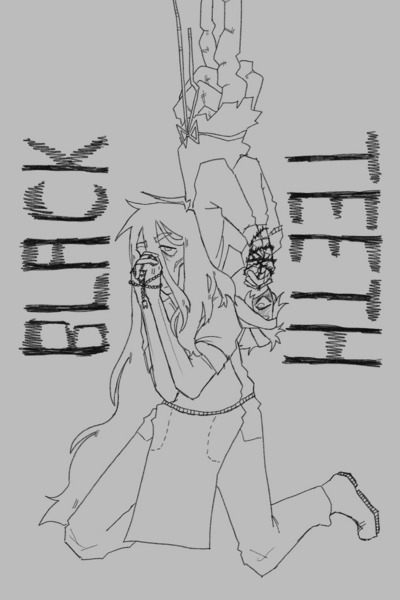This chapter contains the following trigger warnings:
Detailed dentistry (including the use of syringes, drills, and anesthetics)
Intrusive thoughts about syringes and eyes
Intrusive thoughts about dental drills and gore
Descriptions of eye and mouth gore
Religious delusions
He hadn’t had much business recently because of–though he hated to admit it–his dreams. A dozen phone calls and plenty of emails had gone unanswered in the last few days alone. Dreams. His mind played tricks. Sometimes they were only colors, vague impressions of something, a memory drained from his mind like saliva pulled from a mouth. Other times, scenes shifted him in and out of his body, senses alive or altered by the unstoppable scenery around him. All while his body writhed under the sheets, struggling for air. He woke up sweaty, or with a dry mouth, or with a new bruise. Once or twice, a fresh wound formed a puddle of blood around him. Even on the couch, Machiavelli tossed and turned. And the hands hooked around his jaw, feeling the muscles strain. And the hands curled around his eyes, forcing them open. And the hands moulded his musculature, like clay, like a project, like a riddle. They were not Malin’s hands. These dreams had come long before him, and yet now they resurfaced with a renewed intensity. In some uncountable way, Machiavelli’s suddenly changed waking life gave more material to the dreams.
Now, he looked down at the syringe. How easy, a nightmare told him, how easy would it be to stick the needle in an eye and pull the plunger up? To see what piece of him, Mr. Limbus, or Malin–who would it be?--comes up in that tube. A soul weighs 21 grams. And the windows to its visage beckoned as he slept. Oh, that one darling eye of Malin. Dark brown, unblinking, burning into him. It made Machiavelli sick. The white robes, the tassels, the vows of something–what was he doing? The grim reaper’s flirt, he had said. What was he doing? The dream of Malin’s eye curled up, half-remembered, in the corners of Machiavelli's mind.
The thoughts of the dreams and syringe flashed through his mind for hardly a second. Mr. Limbus barely saw the pallor of Machiavelli’s face shift as he put the syringe next to the other tools. The doctor retrieved a cotton swab and the gel.
“Benzocaine,” he said like a prayer for painlessness, “for your gums.”
Mr. Limbus opened his mouth.
How easy–Machiavelli didn’t let the thought finish. He allowed the old routine of cavity filling to possess his body, guide his hands. The gelled swab pressed against Mr. Limbus’ gums. A buzzing feeling surfaced before giving way to numbness, a definite feeling of something there, but a disconnect in identifying it. Mr. Limbus avoided eye contact. He dropped his eyelids over his eyes, in fact, when Machiavelli fixed a light over his mouth. The deep pinks of his gums and inner cheeks made the darkness beneath them even more jarring.
“Lidocaine…” Machiavelli sounded out each syllable of this second verse. He put the swab to the side of the cart and picked up the syringe. Its needle found the liquid lidocaine, and the doctor’s watchful eyes made sure that the proper amount entered the barrel. Mr. Limbus turned away from the syringe, only to be stopped by Machiavelli’s free hand. The client squeezed his eyelids together, a subtle difference from the passive rest they were in moments prior. Machiavelli oriented the needle to the correct location. Mr. Limbus did not move. The needle entered the gum like a hand reaching into a pocket. And just like that, Machiavelli’s hands–for his mind was far away, dreaming–slipped the now-empty syringe out and refilled it. The cycle repeated for the lower gums, a puddle of saliva forming around Mr. Limbus’ tongue.
15 minutes at most.
Some part of Machiavelli’s mind wanted Malin to watch, to talk to him right now. Instead, the distant radio crooned a song, words lost to his ears.
Nobody liked this next part.
Mr. Limbus gagged for a moment, trying to swallow his saliva, when Machiavelli showed him the drill. The rattling noise pouring from it made the little device–no bigger than the rotary brush–seem more daunting than it truly was.
“I promise you, there’s nothing to fear,” Machiavelli said, angling the drill so Mr. Limbus could see its small size, “Look at it. Such a small thing. And my hands do not shake. Focus on the music. Focus on me. There’s nothing to fear.” His voice was flat, scripted, almost insincere. But he did let the drill linger, powered down briefly, a safe distance from Mr. Limbus’ face. The mercy of putting a face to a fear. Machiavelli put one hand on Mr. Limbus’ cheek, holding it in place. The drill came back to life.
The easy strokes of the drill bore into the cavities dotting the premolars. What if he never stopped it? Beneath the enamel and dentin laid blood and quieted nerves. Would they well up? Would the drill slow down as it filled with soft tissue? Or would the darkness of the cavities go deeper? How deep? Machiavelli’s hand kept Mr. Limbus’ mouth open. His eyes blazed. Mr. Limbus was more than just flesh, he reminded himself. Angels were watching, tipping Machiavelli into hell. Were they the ones who gave him dreams?
“There,” The doctor put down the drill, surprising himself with the lack of blood on his hands or in his client’s mouth, “Now, I’ll shape the hole, rinse it, and then get the filling going. All good?”
Mr. Limbus gave a small nod, not daring to close his mouth.
“Good. Good,” Machiavelli moved into the next act, replacing the small drill with an excavator. Mere seconds of scraping later, the excavator retired and the suction tube and rinser took its place. A carver and some sickle probes sat at standby. The doctor’s blue gloves crinkled as he rinsed away the remnants of decay and sucked them back up, an interlude to the meat of the operation. Well, ‘the meat’ wasn’t accurate. The root of the problem would be close, but the damage didn’t spread that far. Now wasn’t the time for this. His hands moved without him, puppets in a well-rehearsed show. One hand flicked the switch on the light craned over Mr. Limbus, softening but allowing for enough vision to work.
“Resin composite hardens under the light,” The doctor recited, “If it hardens too fast, it will be hard to shape correctly.”
Hundreds of ears heard the same sentence, scattered across time. Angels.
The suction tube and rinser swapped places with the condenser, topped with a small amount of adhesive. A quick prod added the adhesive to the tooth, followed by a dental curing light, and finally the composite itself. Now, the mouth mirror watched the carver shape the composite into what the tooth once looked like. The familiar curves of the premolars, the boundaries between the teeth… a sculpture. A monument to a lifetime of work. Another light cure, and then he started again. Machiavelli couldn’t recall if he blinked or breathed as he repeated the routine on all the mouth’s cavities, washing away the darkness from the gates of the temple. His thoughts drifted in and out, unable to take shape.
One more washing. One more rinse. A couple of drops of saliva spilled onto the dental bib. Mr. Limbus rubbed his jaw, pushed it back into place after Machiavelli loosened his grip. If he hadn’t been numbed, he might have complained. Instead, he spat into a tissue and tried to rub away the numbness. Machiavelli stood to the side, organizing the tools he had and hadn’t used. The autoclave waited, hidden behind closed cabinet doors.
“Only try to eat or drink when the numbness wears off,” Machiavelli said, “It should clear up by the time you make it home.”
Mr. Limbus mumbled something that sounded like “Good to know.”
Machiavelli unhooked the dental bib and helped Mr. Limbus to the front office. He could walk, of course, but he stared blankly ahead and reached for the wall. Machiavelli almost expected Malin to be sitting among the vacant chairs. But he and Mr. Limbus were the only two around. The doctor guided Mr. Limbus through payment and, with a pat to the back, sent him on his way. Mr. Limbus stumbled out wordlessly.
How easy it would be to lay down on the couch afterwards. However, the autoclave needed filling, and he had cooking to do. No time to rest. No time to let the shaking of his hands stay unattended.











Comments (0)
See all